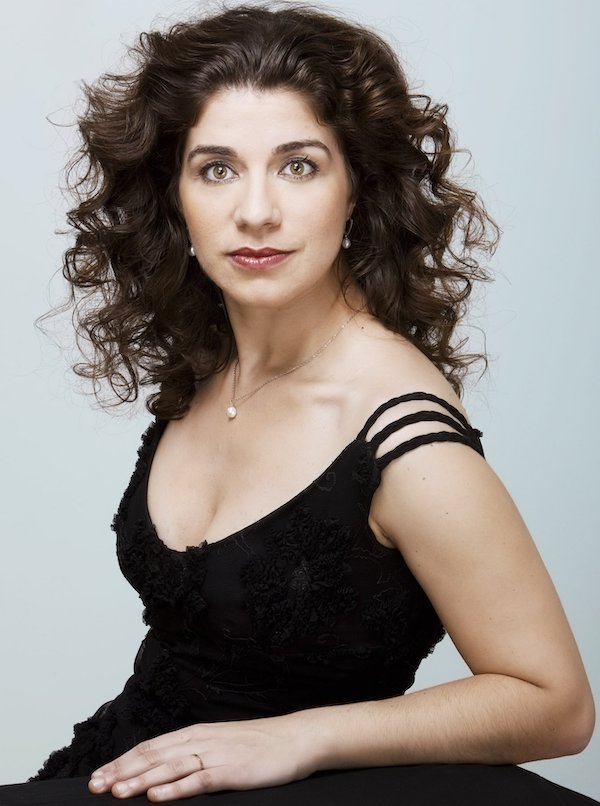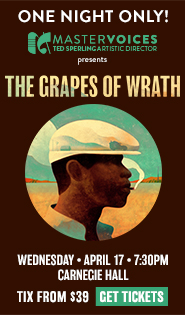Bargemusic rocks the new year with five premieres at Here and Now

In this season of “year in review” articles, Bargemusic did something similar for New York’s composer-performers Friday night—launching its Here and Now Winter Festival with a flurry of pieces composed in 2019, including five world premieres.
In media as familiar as piano solo and string trio and as exotic as a koto-cello duo and a sort of superfiddle called a “fadolin,” local notesmiths went atonal and diatonic and everything in between as they pursued their poetic and literary inspirations.
Most prominent among the latter was Mikhail Bulgakov’s fantasy novel The Master and Margarita. This Stalin-era satire, a favorite of fans of philosophical fiction, inspired a commissioning project by pianist Inna Faliks, who was on hand Friday to give richly colored performances of some of the new works.
It seemed fitting that the youngest composer on the bill, Maya Miro Johnson (born 2001), led off the program with what proved to be the most radical-sounding music of the night, an episodic piano piece titled after the most famous line in Bulgakov’s novel, Manuscripts Don’t Burn. (Second-most-radical honors later went to bass trombonist David Taylor, born 1944.)
Pianist Faliks worked expertly at the keys, the pedals, and inside the instrument to produce the volatile mix of roars, pings, and misty resonances in this world premiere of Johnson’s score.
Composer Veronika Krausas took a more traditional approach to the instrument but added words in The Master and Margarita Suite for Speaking Pianist, five movements of which also made their world bow Friday. Faliks prefaced each of the excerpts by reciting a passage from the novel, then gave characterful performances of a swaying waltz, a puckish fantasia, a boisterous bagatelle, a sarabande à la Satie, and a Scriabinesque cloud of bells and pedaled scales.
The composer-violist Ljova (aka Lev Zhurbin) was next, with a six-string fiddle of his own invention, the fadolin. (The name refers not to Portuguese café music but to the added F and C strings—“fa” and “do”—in the lower register.) By his account, Ljova originally developed the instrument for convenience in string-band playing, but decided last year it deserved its own repertoire and studies in playing technique, which he called (after Paganini) Caprices.
In yet another world premiere, he played three of these—respectively fluid, dancing, and cadenza-like—with a rough-and-ready folk style, minimal vibrato but plenty of tangy quarter tones, in a spirit of freewheeling fun.
As an encore, Ljova invited the audience to loop him on their phones as he played repeating, shifting figures on his instrument. About 20 attendees took him up on it, playing back an aviary of phone chirps to accompany his improvisation.
No. 4 of the first-evers was Eric Moe’s piano piece Scree Slope, titled after the rubbly, slippery terrain that is the bane of mountain climbers. Begun in leafy Virginia but completed between bouts with the rocky slopes of Montana, Moe’s piece radiated an American blend of sentiment and humor as it slid back and re-negotiated its themes in the composer’s playful performance.
Moe added the New York premiere of his oldie from 2014, Like diamonds, we are cut with our own dust, a sparkling micro-prelude that seemed to take less time to play than the title took to say.
You might wonder how large the repertoire is for the ensemble Duo Yumeno, which consists of koto player Yoko Reikano Kimura and cellist Hikaru Tamaki. The answer is, they’re working on it.
On Friday, the duo gave the New York premiere of Takuma Itoh’s But Beautiful, a piece that borrowed its title (and nothing else) from a 1940s-era Jimmy van Heusen song. Since the song was about contrasts and contradictions, composer Itoh thought its title suited the cultural and acoustic contrasts of the two instruments he was writing for.
But in performance Friday, Itoh’s East-meets-West concept sounded more like East-goes-West, as the koto abandoned its traditionally austere modal melodies for ripe diatonic tunes and guitar-like figurations and strumming. That said, this charming piece was a virtual encyclopedia of each instrument’s tonal possibilities and the ways they could combine, contrast, and accompany each other, realized with admirable feeling and energy by both players.
The evening’s fifth world premiere was Kevin Puts’s Aria for Cello and Piano, featuring cellist Julian Schwarz in long, robust cantabile lines over Marika Bournaki’s lush piano chords. Joined later by a tinkling piano counterpoint, this neo-Romantic song had its passionate say and departed without contrasting episodes, leaving a dreamy impression.
For contrast, there was bass trombonist David Taylor’s extravagant solo Houdini’s Lament. While setting up his various stands and mutes, Taylor entertained the audience with facts and anecdotes about the famous magician, and particularly his spiritualism and tolerance for pain, which set the stage for a trombone monologue that was by turns aggressive, meditative, angry, playful, and exuberant, with tone modified by squawky, grumbling, or wow-wowing mutes, multiphonics, and a device for electronic reverb/feedback, all of it adding up to a vivid portrait of the artist as a tormented man.
The serenity of two of Adolphus Hailstork’s Three Spirituals for String Trio brought still more contrast. In their New York premiere by the Semplice Players—Avi Nagin, violin; Matthew Cohen, viola; and Julian Schwartz, cello—the two movements charmed listeners with their fervor and verve.
“We Shall Overcome” opened symbolically with the tune in unison—not octaves, but all on the same pitch—then gave it to the viola as the cantus firmus in a Bach-style chorale prelude. “It’s a Great Day” jumped with syncopation, swelled with double-stopping to a big-band sound, and closed the evening with a joyful burst of fast fiddling.
The program will be repeated 6 p.m. Saturday and 4 p.m. Sunday. bargemusic.org; Saturday tickets here and Sunday tickets here.



